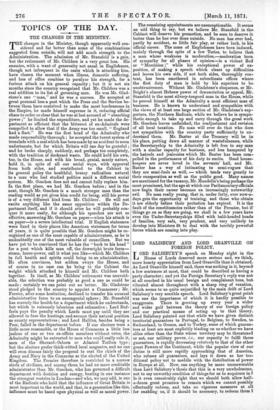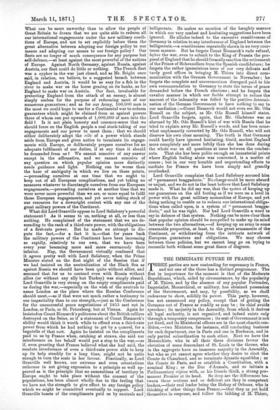LORD SALISBURY AND LORD GRANVILLE 0N FOREIGN POLICY.
LORD SALISBURY'S speech on Monday night in the, House of Lords deserved more serious and, we think, more hearty appreciation from Lord Granville than it obtained. As Lord Granville himself said, there was nothing in it, beyond a few sentences at most, that could be described as having a party character ; and yet the Foreign Secretary's reply was not at all couched in his usual benign and complaisant tone, but. vibrated almost throughout with a sharp ring of vexation, which seems to us quite unjustified by the main drift of Lord Salisbury's very sensible speech. Lord Salisbury's great point was one the importance of which it is hardly possible to exaggerate. There is growing up every year a wider and wider gulf between the theory of our foreign policy. and our practical means of acting up to that theory. Lord Salisbury pointed out that while we have given distinct territorial guarantees to Portugal, to Belgium, to Sweden, to Switzerland, to Greece, and to Turkey, some of which guaran- tees at least are most explicitly binding on us whether we have allies other than the State whose territory may be threatened or not, our military power, i.e., our capacity to fulfil these. guarantees, is rapidly decreasing relatively to that of the other great Powers of the Continent, while the popular view of our duties is still more rapidly approaching that of America, who refuses all guarantees, and lays it down as her tra- ditional policy not to meddle with the distribution of power in Europe at all. Now, can anything be more unanswerable than Lord Salisbury's thesis that this is a very unwholesome, not to say unworthy condition of things for us to acquiesce in Is it even conceivably right that we should both allow half- a-dozen great promises to remain which we cannot possibly- effectually redeem, and take no vigorous measures at all for enabling us, if it should be necessary, to redeem them What can be more unworthy than to allow the people of Great Britain to dream that we are quite able to redeem all our international engagements under the new military condi- tions of Europe, and not to set explicitly before them the great alternative between adapting our foreign policy to our means and adapting our means to our foreign policy? Our fleets are no longer of much consequence for any purpose but self-defence,—at least against the most powerful of the nations of Europe. Against North Germany, against Russia, against Austria, our fleet could do little or nothing. The French fleet was a cypher in the war just closed, and as Mr. Bright once said, in relation, we believe, to a suggested breach between England and Austria, it would be as easy for a fish in the -river to make war on the horse grazing on its banks, as for England to make war on Austria. Our fleet, invaluable for protecting England from the attack of an enemy, is almost simply useless for the purpose of redeeming most of our numerous guarantees ; and as for our Army, 100,000 men is the most we could hope to use for a Continental war to redeem guarantees which might be claimed from us against powers three of whom can put upwards of 1,000,000 of men into the field ? Is it not plain honesty and common-sense that we should force on the English people a real stock-taking of our engagements and our power to meet them ; that we should either deliberately adopt the role of a power which stands aside from Europe and gives notice to terminate its engage- ments with Europe, or deliberately prepare ourselves for an adequate fulfilment of our duties, if at any time it should be demanded from us ? We cannot conceive of any answer except in the affirmative, and we cannot conceive of any question on which popular opinion more distinctly needs guidance and light. Nothing can be worse than the haze of ambiguity in which we live on these points, —persuading ourselves at one time that we ought to keep out of all European complications, and yet taking no measures whatever to disentangle ourselves from our European engagements,—persuading ourselves at another time that we were never more powerful than we are, or more equal to fulfil those European engagements, and yet never taking stock of our resources for a downright contest with any one of the great military powers of the Continent.
What did Lord Granville oppose to Lord Salisbury's powerful statement As it seems to us, nothing at all, or less than nothing. He complained of the statement that we are de- scending to the rank of a third-rate power, with the obligations of a first-rate power. But he made no attempt to dis- pute the fact,—for a fact it is,—that for years back the military powers of the Continent have been increasing so rapidly, relatively to our own, that we have been every year becoming more and more enormously their inferior. Nay, the Government virtually confessed that it agrees pretty well with Lord Salisbury, when the Prime Minister stated on the first night of the Session that if we had insisted on the neutralization of the Black Sea as against Russia we should have been quite without allies, and assumed that for us to contend even with Russia without allies (or without any ally but Turkey) was simply absurd. Lord Granville is very strong on the empty compliments paid us daring the war,—especially on the wish of the neutrals to name London as the place where the Russian Conference should meet,—as if that were not much rather a testimony to our impartiality than to our strength,—just as the Conference for the unsuccessful peace negotiations of 1855 met not in London, or Paris, or St. Petersburg, but at Vienna. Again he insistedon Count Bismarck's politeness about the British colliers destroyed on the Seine, as if a statesman of Count Bismarck's ability would think it worth while to offend even a third-rate power from which he had nothing to get by a quarrel, for a bagatelle of that sort. Again he insisted on the compliments paid to us by France when, catching at straws, she said our
interference on her behalf would put a stop to the war,—as
if, even granting that France believed what she had said, the resolute interference of even a third-rate power able to keep up its help steadily for a long time, might not be quite
enough to turn the scale in her favour. Practically, as Lord Granville well knows, our extreme and even ostentatious
reticence in not giving expression to a principle so well ap- proved as is the principle that no annexations of territory in Europe ought to take place without the consent of the
populations, has been almost wholly due to the feeling that we have not the strength to give effect to any foreign policy which we might be -committed eventually to support. Lord Granville boasts of the compliments paid us by neutrals and belligerents. He makes no mention of the haughty manner in which our very modest and hesitating suggestions have been ignored. He alludes indeed to the excessive sensitiveness of Germany in relation to any interference of England between the belligerents,—a sensitiveness repeatedly shown in no very cour- teous manner. But he forgets Count Bismarck's rude refusal, before the war, even to submit to the King of Pruaeia the pro- posal of England that he should formally sanction the retirement of the Prince of Hohenzollern from the Spanish candidature; he forgets the rather ignominious issue of our very delicate and tardy good offices in bringing M. Thiers into direct com- munication with the German Government in November ; he forgets the complete and unceremonious disregard paid to his own recommendation to Germany to state the terms of peace demanded before the French elections ; and he forgets the cavalier manner in which our feeble attempt to reduce the amount of the indemnity was foiled by the positive determi- nation of the German Government to have nothing to say to our mediation ;—Count Bismarck would not even see Mr. Odo Russell on the subject, as Mr. Odo Russell himself states. Lord Granville forgets, again, that Mr. Gladstone was so alarmed by Mr. Odo Russell's hint of war with Russia that he tried to explain away Mr. Russell's words, and has been some- what unpleasantly corrected by Mr. Odo Russell, who will not disavow his own clear meaning. The truth is that Germany could hardly have ignored hesitating, timid, modest England more completely and more loftily than she has done during the whole war on all questions at issue between the combat- ants. That she has been polite enough on immaterial points where English feeling alone was concerned, is a matter of course ; but in our very humble and unpretending efforts to mediate for France we have been simply and grandly overlooked.
Lord Granville complains that Lord Salisbury accused him of "permanent braggadocio." No charge could be more absurd or unjust, and we do not in the least believe that Lord Salisbury made it. What he did say was, that the system of keeping up our guarantees on the old footing as if we were on a level in power with the great military monarchies of Europe, and yet doing nothing to enable us to redeem our international obliga- tions when called upon, is a system of "permanent bragga- docio," and he was right. Nor had Lord Granville a word to say in defence of that system. Nothing can be more clear than that popular opinion should be compelled to make up its mind between the two alternatives,—of keeping up an army in some reasonable proportion, at least, to the great armaments of the Continent, or withdrawing from the intricate network of European guarantees and obligations. We may choose between these policies, but we cannot long go on trying to reconcile both without some great fiasco of disgrace.



































 Previous page
Previous page